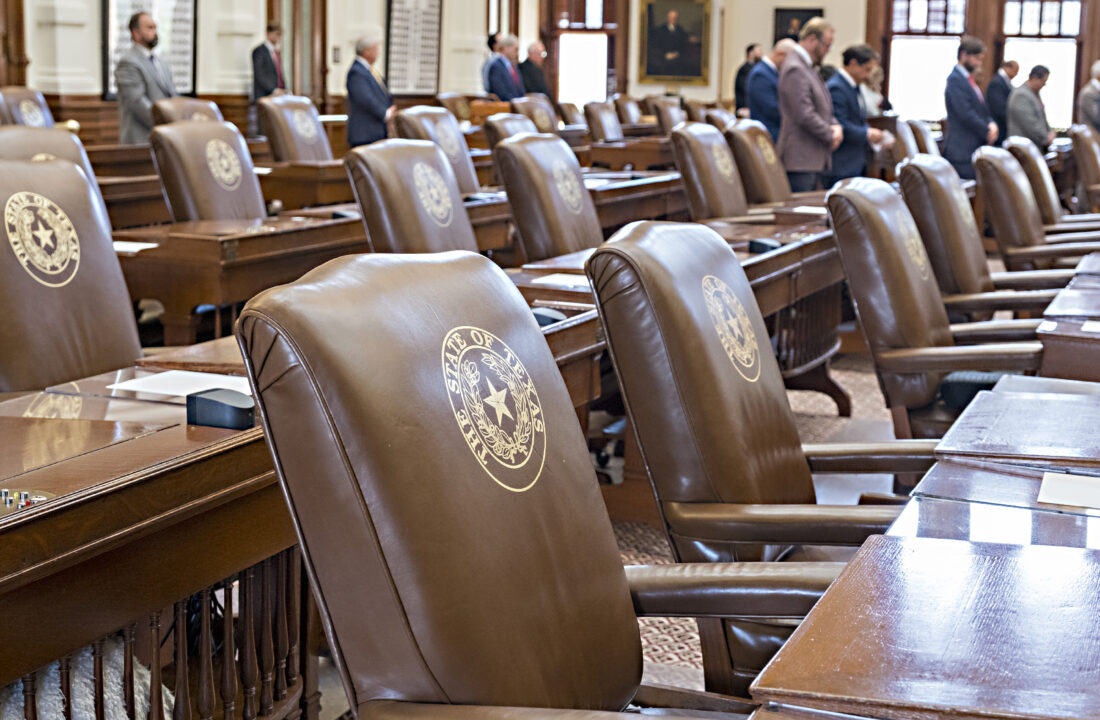Texas Democrats head to California
Battle over congressional redistricting widens

Empty chairs belonging to House Democrats remain empty during session convocation in protest to a redistricting map in the State Capitol on Tuesday in Austin, Texas. (AP Photo/Rodolfo Gonzalez)
AUSTIN, Texas (AP) — The Texas House of Representatives failed to meet a quorum on Friday for the third time this week as Democratic lawmakers continued their walkout to block a vote on congressional voting maps sought by President Donald Trump in a widening national battle over redistricting.
Texas Republicans had warned they would escalate efforts to end the nearly weeklong holdout if defiant Democrats don’t return to the state Capitol. But the Democrats who bolted for points across the country on Aug. 3 still didn’t come back for Friday’s scheduled House floor vote.
The state constitution requires at least 100 members present for the 150-member House to do business, and Republicans hold an 88-62 majority in the chamber. Only 95 lawmakers were counted as present.
Frustrated Republican leaders have promised to ratchet up the pressure if the walkout persists, including expanding efforts to try to remove Democratic lawmakers from office and seeking help from the FBI to assist Texas state troopers trying to find them.
“We have all hands on deck, we are continuing to explore” options to force Democrats home, House Speaker Dustin Burrows said after the chamber failed to reach a quorum. “We will keep pressing forward until the job is done … Each one of you knows eventually you will come back.”
The House is scheduled to reconvene Monday afternoon.
The dozens of Texas House Democrats who left the state have shown no signs of buckling for now: A group of them was scheduled to appear later Friday with Gov. Gavin Newsom and former House Speaker Nancy Pelosi in a public show of support for the walkout. Newsom has said he will push to redraw his own state’s lines in retaliation if Texas reshapes its maps for the 2026 elections.
Texas has been the epicenter of Trump’s push to gerrymander congressional maps to shore up Republicans’ narrow House majority before next year.
Texas Attorney General Ken Paxton has pledged legal action to try to get the missing Democrats removed from office if they do not return to the House chamber.
“I don’t think it’s going to go anywhere,” state Rep. Richard Raymond, one of a handful of Democrats present Friday, said of Paxton’s threats. When asked how long his colleagues will stay away, Raymond said, “I have no idea.”
State Rep. Gene Wu, the chairman of the state House Democratic Caucus, faced a Friday deadline to respond to a similar effort to remove him from office filed by Gov. Greg Abbott with the state Supreme Court.
“We have an agenda to pass priorities critical to Texans, and we will get it done. I’ll call special session after special session–no matter how long it takes–until the job is finished,” Abbott posted Friday on the social platform X.
The current special session ends Aug. 19, and the missing lawmakers already face mounting fines for every day they are gone, and civil arrest warrants issued by the state House.
Trump wants five more seats out of Texas to potentially avoid a repeat of the 2018 midterms, when Democrats reclaimed the U.S. House and proceeded to thwart his agenda and impeach him twice.
While their minority status allows them only to delay, the Texas holdout has inspired Democrats and progressives around the country.
Newsom wants Democratic gerrymandering in California if Texas proceeds, though voters would have to bypass an independent redistricting commission. Illinois Gov. JB Pritzker and New York Gov. Kathy Hochul, both of whom have appeared alongside Texas Democrats who relocated to their states, have also declared their intent to push new maps if they are necessary to neutralize Republican maneuvers.
Republicans are responding as well. In Florida, the state’s Republican House speaker announced this week that his chamber will take up the issue this fall, through a select committee on congressional redistricting.
The dynamics could embroil the 2026 midterm campaign in legislative and court battles testing Trump’s power over the Republican Party, Democrats’ ability to mount opposition and the durability of the U.S. system of federalism that balances power between Washington and individual states.






